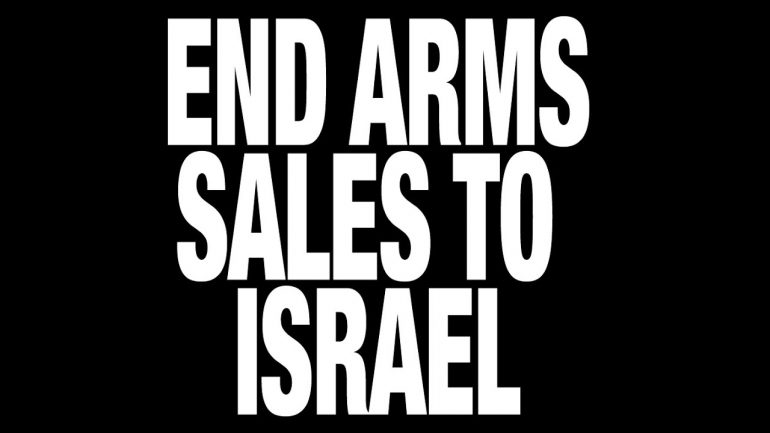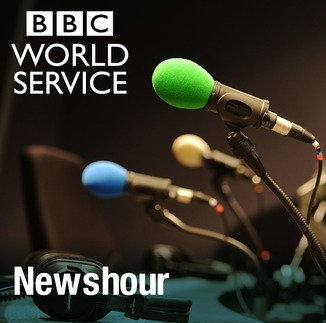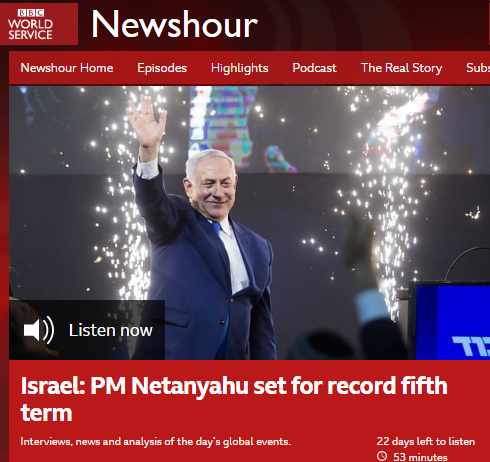On March 26th BBC Radio 4 news and current affairs programmes understandably devoted a considerable amount of airtime to the topic of the letter put out the previous evening by the Board of Deputies of British Jews and the JLC criticising the leader of the British Labour Party and calling for a protest outside Parliament.
One of those programmes – ‘World at One’ – seemed to attempt to present listeners with a more comprehensive view of the background to the story than others, but did that portrayal really give audiences the full view?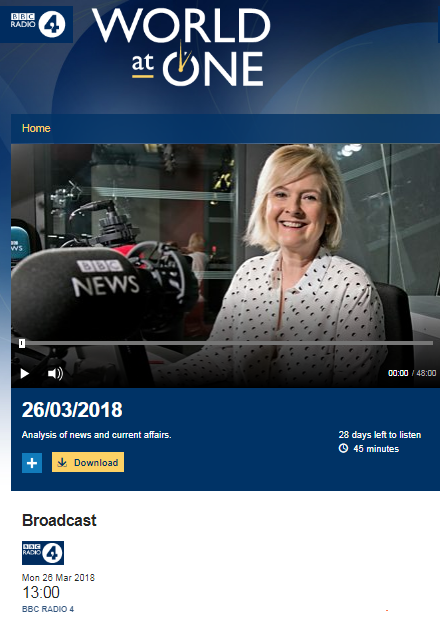
Presenter Martha Kearney opened the item (from 07:21 here) as follows: [emphasis in italics in the original]
Kearney: “At half past five this afternoon Jewish community leaders are gathering at Westminster in a protest against Jeremy Corbyn, accusing him of siding with antisemites again and again. They say it’s their first protest against a mainstream political party since the Second World War. The Labour leader has responded by saying ‘we recognise that antisemitism has occurred in pockets within the Labour Party, causing pain and hurt to our Jewish community in the Labour Party and the rest of the country’. He added ‘I’m sincerely sorry for the pain which has been caused’. These accusations have been levelled at Jeremy Corbyn for years.”
Kearney then presented her first example and – in contrast to her colleagues at the BBC News website – was able to give an accurate portrayal of the mural concerned.
Kearney: “In 2012 he offered his backing to a street artist whose mural, featuring antisemitic stereotypes, was due to be removed after complaints. Jeremy Corbyn replied ‘Why? You’re in good company’. He compared the mural to Rockefeller destroying one made by Diego Rivera because it included Lenin. But last week Jeremy Corbyn issued a statement saying ‘I sincerely regret that I did not look more closely at the image I was commenting on’.”
Kearney then cited her next example of “accusations…levelled at Jeremy Corbyn”.
Kearney: “In 2009 Jeremy Corbyn welcomed members of Hamas and Hizballah to the UK and referred to them as friends. He later refused to apologise for this in an interview with Krishnan Guru-Murthy on Channel 4 news.”
Listeners then heard some of the less angry parts of that 2015 interview, including the claim from Corbyn that Hamas and Hizballah are “part of a peace process” and:
“I’ve also had discussions with people from the Right in Israeli politics who have the same view, possibly, that the State of Israel should extend from the river to the sea as it is claimed people from the Palestinian side do.” [emphasis added]
On the topic of his describing members of the two designated terrorist organisations as ‘friends’, listeners heard Corbyn say:
“I’m saying that people I talk to…I use it in a collective way, saying our friends were prepared to talk. Does it mean I agree with Hamas and what it does? No. Does it mean I agree with Hizballah and what they do? No.”
Martha Kearney did not however inform listeners that in the original March 2009 speech in which he repeatedly called Hamas and Hizballah ‘friends’, Corbyn also spoke about Hamas – an organisation committed to the destruction of Israel under its overtly antisemitic founding charter – as follows:
“The idea that an organisation that is dedicated towards the good of the Palestinian people and bringing about long-term peace and social justice and political justice in the whole region should be labelled as a terrorist organisation by the British government is really a big, big historical mistake…”
Neither were ‘World at One’ listeners told that – despite the ‘explanation’ they heard for his use of the term ‘friends’ and the claim that it does not mean that he agrees with Hamas and Hizballah – Corbyn clearly expressed his opposition to the Jewish people’s right to self-determination in their own state: a stance categorised as antisemitism under the IHRA working definition.
“We are opposed to Zionism and what Israel is doing towards the Palestinian people. […] Our argument – and I refuse to be dragged into this stuff that somehow or other because we’re pro-Palestinian we’re anti-Semitic: it’s nonsense. What we’re in favour of is a Palestine where everybody can live. They can’t live if you’ve got Zionism dominating it all.”
Martha Kearney’s next example referred to a story the BBC failed to report accurately at the time.
Kearney: “In 2016 Naz Shah, the Labour MP for Bradford West, apologised for writing a series of antisemitic posts on Facebook, including arguing for Israel’s population to be transported out of the Middle East. Then, while defending Naz Shah, the former London mayor Ken Livingstone claimed that Hitler had been a Zionist. He was suspended but not expelled from the Labour Party and spoke to the ‘World at One’.”
Listeners then heard parts of Kearney’s 2016 interview with Livingstone, including his insinuation that “people” were “smearing and lying about” him and the claim that “if you’re a bigot, you’re not going to join the Labour Party”.
After parts of the letter written by the Board of Deputies and the JLC had been read out, Kearney went on:
Kearney: “During the 2015 Labour leadership contest Jeremy Corbyn took calls from listeners on the ‘World at One’. One of them was Lee Barnett from Richmond.”
Listeners heard a recording of Mr Barnett speaking about antisemitism and Holocaust denial “posted by those who say they’re your supporters” followed by Corbyn responding that he had spent his life as a campaigner against racism and mentioning his mother’s presence at Cable Street in the 1930s – but without substantially addressing the caller’s points. That 2015 recording continued with Martha Kearney saying to Corbyn: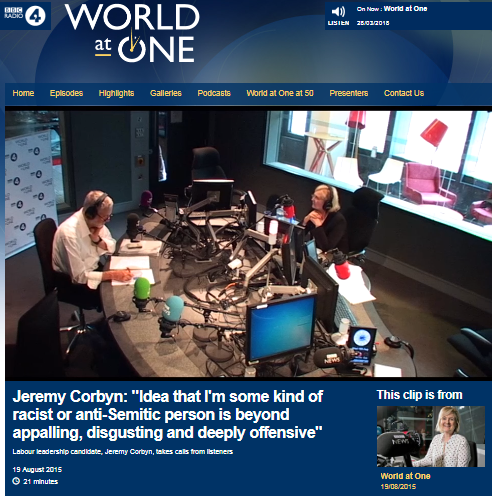
Kearney: “But there have been questions raised about the kind of people that you associate with: story in the papers today about the fact that you invited Diane [sic] Abu Jahjah to the Commons as a special guest. Now this is a man who’s talked about ‘hoax gas chambers’.”
Corbyn: “Sorry, who?”
Kearney: “You’ve not met him?”
Corbyn: “No. Well I’ve…I saw the name this morning and I asked somebody who is he.”
Kearney: “Right so this was somebody who…so you definitely didn’t invite this man to the Commons as a special guest?”
Corbyn: “Well my views are that the Holocaust was the most disgraceful and vile process of the history of the twentieth century, if not the wider world. And that has to be understood by successive generations and has to be understood by all our children in schools. That surely is important. The idea…”
Kearney: “So just to be absolutely clear on this: there’s an accusation which I think you’re denying. I’m giving you the opportunity to deny it.”
Corbyn: “The idea that…the idea…”
Kearney: “You didn’t invite this man?”
Corbyn: “I’m sorry; can I answer please? The idea that I’m some kind of racist or antisemitic person is beyond appalling, disgusting and deeply offensive. I’ve spent my life opposing racism. Until my dying day I will be opposed to racism in any form.”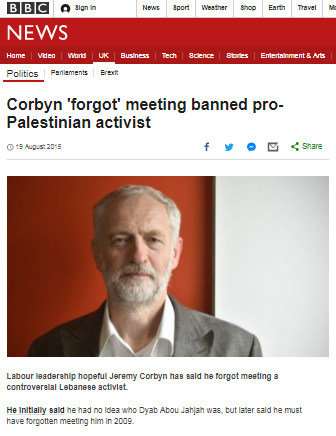
Kearney closed that section of the item there, moving on to another related topic. Remarkably though, despite having aired Corbyn’s recorded response denying knowing who Dyab Abou Jahjah was, Kearney did not bother to inform listeners that – as the BBC itself reported in August 2015 – Corbyn subsequently claimed that he “must have forgotten meeting him in 2009”.
Dyab Abou Jahjah (whose organisation had published a Holocaust denying cartoon three years earlier) was in fact at the same March 2009 ‘Stop the War Coalition’ meeting at which Corbyn called Hamas and Hizballah ‘friends’. Abou Jahjah was subsequently banned from visiting the UK by the British government: a decision he blamed on “the lobbying of the Zionists” while claiming that “MP Corbyn is filing a complaint against this disgrace”.
Although this programme clearly did attempt to provide the BBC’s domestic audiences with more background to the story than other Radio 4 programmes aired on the same day, it is notable that while listeners did hear rather a lot of Jeremy Corbyn’s fairly standard evasive responses to the long-standing criticism against him, parts of the story that are highly relevant to full audience understanding of it – such as the fact that he did meet Dyab Abou Jahjah and his self-professed opposition to Jewish self-determination – were airbrushed from the portrayal.
Related Articles:
BBC News not sure whether Corbyn controversy mural antisemitic or not
BBC News ‘explanation’ of antisemitism promotes the Livingstone Formulation

